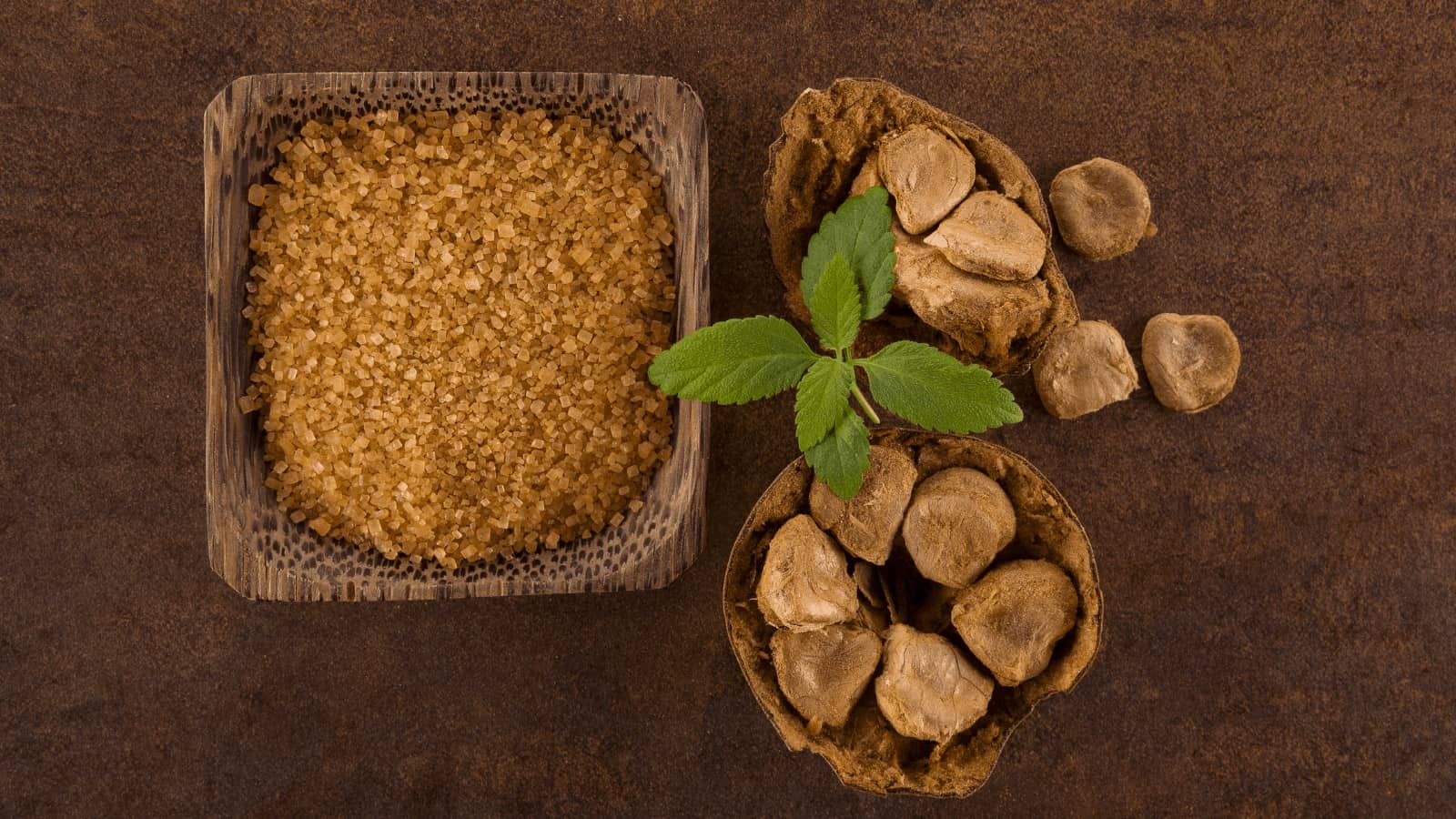(Editor’s Note 8/13/2023): Article has been clarified to remove talking points on monk fruit and metabolism and body composition, and to show that while there is evidence from multiple animal studies to suggest that monk fruit consumption may help to improve aspects of health listed in this article, more clinical human trials are needed to fully measure efficacy)
People worldwide consume several types of fruits every day, but there’s one fruit that doesn’t often get enough attention. The next time you’re at the grocery store or farmer’s market, consider purchasing a monk fruit.
These fruits may not stand out because they’re not bright in color, like apples or citrus fruits. Still, the monk fruit has gained more attention in the past few years because it can be significantly beneficial for people who suffer from several health conditions. This fruit is free of sugar, which is one of the things that makes it stand out as an effective natural treatment. It can be consumed as a fruit or ground into a fine powder to be used in place of sugar.
Excess sugar consumption is a habit that many people have difficulty breaking, even though it has been proven that too much sugar can have devastating effects on physical health. Several natural sweeteners are much sweeter than sugar, which makes it easier to make the switch to a healthy substitute for sugar. This superfood has become one of the best choices for natural sweeteners since it doesn’t cause inflammation in the body the way sugar does, which can lead to other chronic conditions.
What Is Monk Fruit?
 If the name of this fruit doesn’t seem familiar to you, you may have heard of monk fruit referred to as longevity fruit, Buddha fruit, or Luo Han Guo. The fruit comes from the Siratia grosvenoori vine, which is in the gourd family.
If the name of this fruit doesn’t seem familiar to you, you may have heard of monk fruit referred to as longevity fruit, Buddha fruit, or Luo Han Guo. The fruit comes from the Siratia grosvenoori vine, which is in the gourd family.
These nutritious fruits grow well in China and Thailand and have been used as a natural remedy, food additive, and sweetener in these countries for hundreds of years. Since this natural food is noticeably sweeter than sugar due to its high fructose and glucose content, the sweetness comes from unique glycosides in the fruit’s flesh.
In addition to using monk fruit to make foods and beverages sweeter, the nutrients, vitamins, organic compounds, and antioxidants in the future offer a wealth of health benefits.
Fifteen Reasons to Add Monk Fruit to a Healthy Diet
These reasons will compel you to try it!
1. Natural Obesity Fighter
Processed sugar is a factor in many of the major diseases we face. If you’re trying to cut down on your caloric intake but still want something sweet now and then, you can use the fruit as a sweetener when you’re baking pies or cookies. Or, add it to coffee and sweet tea to lower the calories and sugar content in these treats. This natural sweetener contains zero fat and only two calories per teaspoon, making it an excellent addition to your diet.
2. Relieves Allergy Symptoms
When our bodies are exposed to something that prompts an adverse response, the mast cells will release histamine and other chemicals into the system to fight off the foreign “invader.” This is more commonly known as allergies. You may also have reactions like nasal and throat irritation, inflammation, coughing, and sneezing.
According to the Journal of Dairy Science, monk fruit extract can stop these reactions by prohibiting the mast cells from releasing histamines. Using the extract of the fruit can also treat and alleviate asthma attacks, which can be life-saving.
3. Promotes Weight Loss
This superfruit is calorie, carb, and fat-free, so it’s a wonderful option if you’re trying to lose or maintain weight. You can save a considerable amount of carbohydrates and calories by using this natural sweetener instead of table sugar in your food and beverage recipes. If you’re buying the fruit in “sugar” form, make sure there are no other ingredients in the sweetener that will add to your caloric intake.
Worried about safety? The United States Food and Drug Administration (FDA) deems it generally safe for consumption.
4. Contains Powerful Antioxidants
This naturally sweet fruit contains antioxidants, according to the Journal of Food Sciences and Nutrition. This is why some people call it the “longevity fruit.” Antioxidants are essential for helping the body fight free radicals and a variety of diseases. Antioxidants also make the immune system stronger and minimize the likelihood of conditions like respiratory ailments.
5. Has Anti-Microbial Properties
Sugar feeds microbes in the intestines, which is why consuming too much sugar can be harmful. “Longevity fruit,” on the other hand, has antimicrobial properties that help the gut maintain a proper bacterial balance. Extracts from the fruit have also been used to fight streptococcus, bacteria, and candida to keep gum disease, illnesses, and yeast infections at bay.
6. May Improve Cardiovascular Health
In 2020, the Journal of Ethnopharmacology published a study they conducted on lab rats. They found that the animals showed lowered cholesterol levels, a key factor in cardiovascular health. Additionally, they confirmed that monk fruit shows promise in reducing diabetes.
(Editor’s Note 8/13/23: More human studies needed to measure efficacy on people)
7. Minimizes Inflammation
This fruit is regarded as a cooling agent in Chinese medicine. This is why it is the main ingredient in several natural medications and beverages. The fruit’s cooling property means it helps combat conditions that make the body too hot, like inflammation, fever, or heat stroke. Consuming the juice of the fruit or adding the “sugar” of the fruit to a beverage can cool the body down.
Modern-day studies agree that this fruit provides anti-inflammatory benefits.
8. Controls Diabetes
Diabetes is one of the most harmful and common diseases of modern times. The condition is caused by the body’s inability to control glucose and insulin levels. Regular sugar can spike insulin and glucose levels too high, which can wreak havoc on the body. Monk fruit doesn’t affect blood sugar and is considered a safe alternative to white or brown sugar.
9. Anti-Fibrotic
Pulmonary fibrosis, a condition in which the tissues of the lungs become scarred and rigid. This makes it difficult for the lungs to retrieve oxygen from the air and affects a person’s ability to breathe. Research indicates that this fruit is anti-fibrotic due to an element called mogroside IIIE, which can be beneficial for people with pulmonary fibrosis.
10. Might Prevent and Treat Cancer
One study suggests that monk shows great promise in fighting pancreatic cancer.
Other research projects show that the high levels of antioxidants might be useful in the future to decrease other cancers, as well.
11. May prevent Infections
This delicious superfood can also fight infections. Since there are antimicrobial compounds in the fruit that work to shield the body against harmful bacteria, you can consume this food daily to prevent digestive and oral infections. Consuming the fruit in its “sugar” form is also a helpful natural treatment to prevent tooth decay.
12. Combats Fatigue
A study performed on mice suggests that monk fruit helps to decrease exercise fatigue. The mice who ingested monk fruit were able to increase exercise times (swimming) over 28 days. If you find that you get exhausted often and easily, try this natural food for an energy boost. This is largely due to the nutrients present in the fruit and its antioxidant properties. Regular consumption can strengthen your body so you’ll feel less fatigued throughout the day.
13. Promotes Longevity
The “longevity fruit” or “Luo Han Guo” promotes physical longevity, which is important as we age. Age often comes with a considerable amount of internal stress, more information, and tissue breakdown. Consuming “longevity fruit” regularly can increase your lifespan. That’s because the antioxidants in the mogrosides of the fruit keep the cells from degeneration quickly. You’ll also be protecting your body against free radicals, which can significantly reduce inflammation.
14. Supplies the Body With Essential Vitamins and Minerals
Sugar destroys the body and strips it of essential minerals and vitamins. However, when you consume this superfruit regularly, you can reverse these effects. The fruit has several nutritious elements that help the body fight high glucose levels and inflammation. Monk fruit is also high in vitamin C, which boosts the function of the immune system by prompting the body to produce more white blood cells.
 Final Thoughts on Sweetening Your Foods With Monk Fruit Instead of Sugar
Final Thoughts on Sweetening Your Foods With Monk Fruit Instead of Sugar
Overall, this “longevity fruit” can easily be added to your diet. It might help you keep blood sugar under control, prevent infections, fight cancer, and slow the aging process. Indeed, adding it to your favorite foods or drinks is an easy way to start living a healthier lifestyle.


















